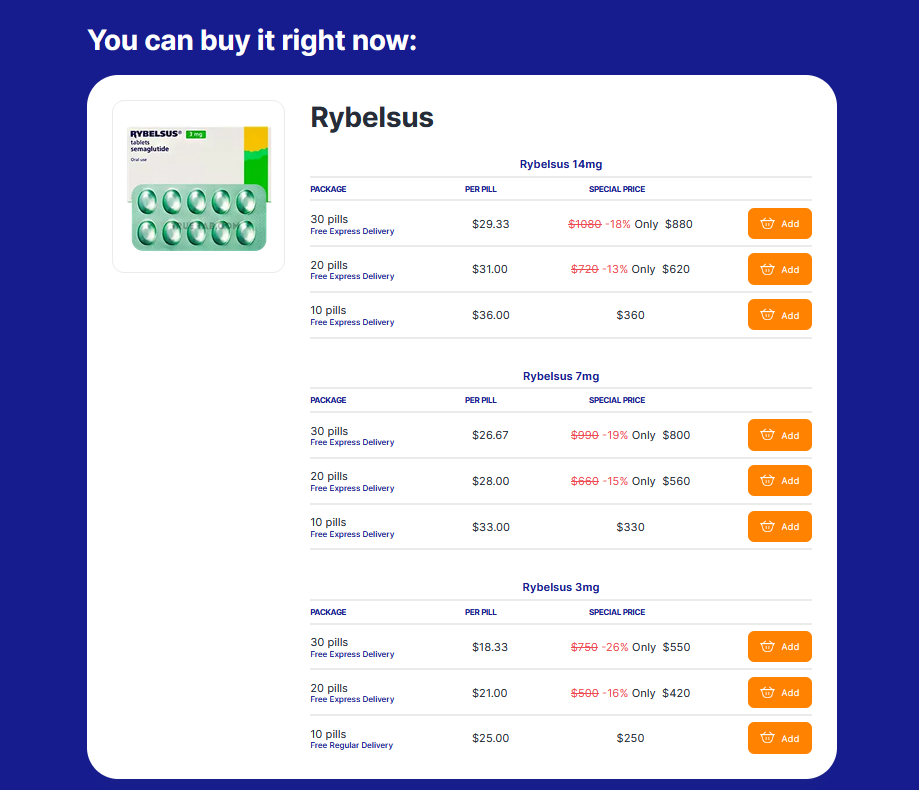Rybelsus 7 Mg Cena: Cost Breakdown and Comparison
Rybelsus 7 Mg Cena: Cost Breakdown and Comparison
Blog Article

When it comes to managing diabetes, continuous advancements in medical science offer hope for improved treatment alternatives and improved quality of life. Rybelsus has emerged as a promising addition to the arsenal of therapies available for individuals with type 2 diabetes. In this article, we delve into what Rybelsus is, how it works, and its potential benefits for patients.Rybelsus, also known by its generic name semaglutide, belongs to a class of medications called glucagon-like peptide-1 receptor agonists (GLP-1 RAs). Unlike traditional insulin injections, Rybelsus comes in a convenient oral tablet form, offering a more accessible and user-friendly approach to diabetes management.
So, Rybelsus's differentiating factor this medication apart from other oral medications for type 2 diabetes? One of its key distinguishing features is its mechanism of action. This medication works by imitating the effects of incretin hormones in the body, which assist in regulating blood sugar levels by encouraging insulin secretion and decreasing glucagon production. By targeting multiple pathways involved in glucose metabolism, Rybelsus helps improve glycemic control in patients with type 2 diabetes.The effectiveness of Rybelsus in lowering blood sugar levels has been demonstrated in clinical trials. Studies have shown that patients treated with Rybelsus experienced significant reductions in hemoglobin A1c (HbA1c) levels, a key indicator of long-term blood sugar control. Additionally, Rybelsus has been associated with weight loss, making it an attractive option for patients who struggle with both diabetes and obesity.
Another noteworthy benefit of Rybelsus is its cardiovascular benefits. In clinical trials, Rybelsus has been shown to reduce the risk of major adverse cardiovascular events, such as heart attack and stroke, in patients with type 2 diabetes who have established cardiovascular disease. This cardiovascular risk reduction adds to the overall appeal of this medication as a comprehensive treatment option for managing diabetes and its associated complications.In terms of safety and tolerability, Rybelsus is generally well-tolerated by most patients. Common side effects may include nausea, vomiting, diarrhea, and decreased appetite, particularly during the initial titration period. However, these side effects often diminish over time as the body adjusts to the medication. As with any medication, it's essential for patients to discuss potential side effects with their healthcare provider and report any concerns promptly.
It's important to note that this medication is not a standalone treatment for managing type 2 diabetes. Lifestyle modifications, including diet, exercise, and weight management, remain key elements of diabetes management. This medication is most effective when used as part of an integrated treatment approach tailored to the individual needs of each patient.In conclusion, Rybelsus represents a significant advancement in the field of diabetes care, offering a convenient oral treatment option with demonstrated efficacy and cardiovascular benefits. By harnessing the power of GLP-1 receptor agonists, Rybelsus helps individuals with type 2 diabetes achieve better glycemic control and reduce their risk of cardiovascular complications. As with any medication, it's crucial for patients to work closely with their healthcare provider to determine the most appropriate treatment approach for their unique needs.
Rybelsus is an oral (tablet) medication used to treat and manage Type 2 Diabetes, and in treating weight loss.
The active ingredient in this medication is Semaglutide, which mimics the action of one of your body's natural hormones (GLP1). It contains the same ingredient as Ozempic, which is given as a once-weekly injection. Unlike the injections, this medication is a tablet taken once daily.
RYBELSUS® may potentially lead to severe side effects, such as:
Risk of Thyroid Tumors: It's imperative to notify your healthcare provider immediately if you experience any lump or swelling in your neck, hoarseness, difficulty swallowing, or shortness of breath. These symptoms could indicate thyroid cancer. Studies conducted with rodents have revealed that RYBELSUS® and medications with similar mechanisms may induce thyroid tumors, including thyroid cancer. Whether RYBELSUS® poses the same risk for humans, including the development of medullary thyroid carcinoma (MTC), remains uncertain.
It's advised not to use RYBELSUS® if:
You or any of your family members have a history of MTC, or if you suffer from Multiple Endocrine Neoplasia syndrome type 2 (MEN 2), a condition affecting the endocrine system.
You have previously experienced a severe allergic reaction to semaglutide or any components present in RYBELSUS®. Look out for symptoms of a serious allergic reaction, detailed in the section "What are the potential side effects of RYBELSUS®?"